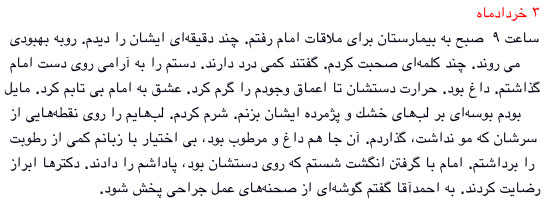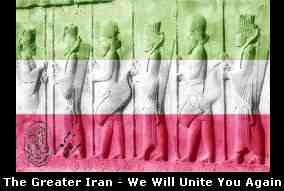- It is stories like this that bring hope that Iran will be free and united. Iran will not be free unless the people from all parts of Iran fight. The Kurdish people of Iran are known to be honourable and hard working. Their loyalty to the Iranian homeland is admirable especially because of the suffering they have endured over the many years. In the article, the PJAK mentions that they have had contacts with the MEK. If this is true, which it definately is, then this may signal a change in attitudes of the Iranian resistance from working alone and independantly to cooperation and brotherhood. I hope this is true. This is also a signal to other political parties to get on the ball. The best way that we can keep Iran together is if we work with each other, especially those groups that represent the ethnic minorities, so that we may topple this regime. I am calling for other political groups to contact organizations like the PJAK so that we may all work together.__________________________________________________In the mountains with a Kurdish opposition group trying to bring democracy to Iran. KANDEEL, Iraq—The simple, cinderblock and sod-roof, dwellings of the Party for Free Life in Kurdistan (PJAK) don't look much different from those of the surrounding villages in Iraq's Zagros mountains. The plumbing is outdoors and the water comes from mountain streams. Nor do the men and women in the village look much different from those elsewhere in the region—most wear traditional Kurdish clothing, baggy coveralls sashed at the waist, and it's not uncommon to see people with Kalashnikovs slung over their shoulders.
It's only in conversation that the men and women of the PJAK camp, most of whom hail from Iran, begin to distinguish themselves from Iraqi Kurds, who tend to be subsistence farmers with little education. My first night in the PJAK camp, I was treated to a broken-English crash course in the group's ideology—a variant of democratic socialism combined with a call for the Iranian government to adhere to the European Union's convention on human rights.
The group has been exiled to the mountains of northern Iraq during its struggle to bring democracy to Iran, but the members of PJAK remain surprisingly optimistic. They began organizing underground cells and demonstrating in Iran in the mid-1990s, but after facing persecution by the Tehran government in 1999, many members fled and set up a base in Kandeel. In 2004, the group began carrying out small-arms attacks inside Iran against military targets, in response to Iranian aggression against Kurds in the country's western provinces. BBC Persia reported that PJAK killed 120 Iranian police officers during a six-month period in 2005. It is currently one of the largest—if not the largest—Iranian opposition group, claiming 4,000 members in Kandeel and thousands more inside Iran.
PJAK claims that its numbers have risen steadily since its formation, and that its existence is convincing many of Iran's approximately 3.7 million Kurds—about 7 percent of the country's total population—that the theocratic government in Tehran can be challenged both militarily and politically.
"The Iranian government is strong," says Akif Zagros, 28, a former journalist and a founding member of PJAK. "But not that strong."
Since the creation of modern Iran, the Kurdish minority inside the country has endured oppression—as have Kurds in neighboring countries. The Islamic Revolution in 1979 initiated a jihad by the Shiite government against the Sunni Kurds. Iran's Supreme Leader, Ayatollah Ruhollah Khomeini, declared that Kurds were not autonomous and had no reason to seek cultural rights. Such discrimination continues to this day. Kurds in Iran, for instance, are not allowed to receive Kurdish-language education in school—as was the case in Saddam Hussein's Iraq and, until 2004, in Turkey.
In addition to cultural discrimination, Iranian Kurds complain that they do not receive the same services—such as petrol subsidies—as Iranians in other parts of the country, and that the Kurdish provinces, despite being oil-rich, are economically depressed.
Iran's previous president, Mohamed Khatami, attempted to reverse some of this discrimination by including Kurds in the government, authorizing the creation of Kurdish-language chairs at universities, and easing restrictions against Kurdish political activity. But these small steps have been reversed with the election of hardline president Mahmoud Ahmedinejad last year.
PJAK's location in Kandeel is remote—to get to the leadership, one must ride to the end of a two-track road accessible only by 4x4, and then hike for a few hours. But that has not discouraged many young Iranian Kurds from seeking refuge here.
"If I hadn't left Iran, I might have been hanged," says 24-year-old Karwan Agri, a computer engineering student from Markezi in western Iran. Agri says he was part of a PJAK cell at his university, and decided to flee Iran and travel to Kandeel two months ago, after Ahmedinejad's election and a subsequent increase in crackdowns on members of Kurdish political parties. PJAK in particular has received much attention because of its latter-day militancy.
"After Ahmedinejad's election, the situation changed. Freedoms that had existed in Iran before, under Khatami, disappeared. There is now an atmosphere of violence. Eighty percent of university students are opposed to Ahmedinijad's ideology. I know more than 100 students who have left to the mountains since his election."
Zagros says PJAK's armed operations only target the Iranian military and police in response to aggression against Kurds. (To date, there is no evidence that the group ever engages in terrorism against civilians.)
"Defense takes two forms. Some of it is organized here, some of it is organized spontaneously by people in Iranian Kurdistan," he says.
PJAK isn't seeking independence for Iran's Kurdish provinces; rather, the group is calling for an end to the rule by mullahs in Tehran. It is the only Kurdish group in Iran calling openly for the government to reform, although Zagros says his group would negotiate with the mullahs if the latter were willing to end Iran's discrimination against its Kurdish population.
"If the Iranian government accepts our demands, we are ready to talk to them," he says.
In the meantime, the group is focusing on assisting and empowering the Iranian population.
"PJAK supports helping people get off heroin," said Diller, a Kurd from Mariwan, a western Iranian city where PJAK is active. (There are currently an estimated three-to-four million heroin addicts in Iran.) Diller, who is not a member of PJAK, works on the dangerous smuggling route from Iraq to Iran, carrying contraband alcohol across the border because, he says, there is no other employment. "The Iranian government doesn't care about Kurds. They don't supply our cities with the same services they do for the Shiites."
Like the better-known Kurdistan Workers Party (PKK) in Turkey, which advocates for an independent Kurdish homeland, and which has used these mountains as a base since 1991 in a guerrilla war against the Turkish government that has claimed more than 30,000 lives, a major component of PJAK's fight is for women's rights.
"Our aim is to be an alternative to the leadership of Iran, and we organize women toward this aim. The Iranian government deprives women of their freedom," says 26-year-old Golistan Dugan, a female member of the group's leadership council. "Here in the mountains the women are organized."
Dugan left Iran in 1999, in the wake of Kurdish nationalist demonstrations following the arrest of PKK leader Abdullah Ocalan in Turkey. The protests provoked crackdowns by Tehran.
PJAK members claim 45 percent of their membership is female.
"We want not only to include Kurdish women but also Iranian women," Dugan says.
Women in PJAK receive the same political education and military training that the men do, and "daughter guerillas" have participated in the attacks against Iran that began in 2004.
According to the group's charter, 12 of the 21 members of PJAK's elected legislative council must be women; as well, three of the seven members of the leadership council, selected from the legislative council, are women. The group also has three educational subcommittees—focusing on secular democratic education for youth, democracy, and women.
"We send [the people we train] back to Iran to organize underground among the women, young people and university students," Zagros says.
Many of the group's members say they are inspired by Ocalan, and pictures of him and his wife—as well as those of Vian Jaff, a PKK member who recently self herself on fire in Turkey—adorn the walls of PJAK dwellings. But unlike the PKK, the members of PJAK eschew Kurdish nationalist rhetoric, and would prefer a democratic Iran to the formation of a greater Kurdistan. Ocalan is a controversial figure—during his rule of the PKK he was so intolerant of dissent that he sentenced his first wife to death for disagreeing with his policies—but PJAK points to his Declaration of Democratic Confederalism in Kurdistan, released last year, in which Ocalan professed to switch from an autocratic ideology to a democratic one.
Zagros says the PJAK, which counts membership abroad in the Kurdish diaspora in Europe and Russia—which is a major source of the group's funding—has had contact with other Iranian dissidents, including the Mujahideen e-Khalq (MEK), a communist opposition group whose members inside Iraq continue to languish in U.S. custody at Camp Ashraf near the Iranian border, where they have been since shortly after the invasion.
"There is just talk, a primitive agreement, but in our plan there is a widening agreement," Zagros says, declining to elaborate further.
Both the MEK and the PKK remain on the State Department's list of terrorist organizations, but the Iranian government has accused the U.S. of supporting PJAK. Zagros denies this, saying the group has had no contact with the US military or diplomats.
"Our demand is democracy—we accept and welcome [American] support," Zagros says. "But only in accordance with the interests of Kurdish people."
At a PKK base on the other side of the mountain, Abdul Rahman Chaderchi, a member of the PKK's political council, confirms the PKK's support for PJAK and decries the U.S. government's hypocrisy in supporting autonomy for Iraq's Kurds but not for other groups.
"We want the U.S. to see all Kurds with the same eyes," he says.
Kandeel is essentially under PKK control—as one gets deeper into the mountains, checkpoints manned by the Patriotic Union of Kurdistan, the party loyal to Iraqi president Jalal Talabani, give way to PKK outposts. The PUK avoids putting pressure the PKK because of both local sympathies for Kurdish national groups and the fact that it wants to avoid sparking armed conflict. PJAK says they have no relationship with the PUK, and Zagros criticized the autocratic nature of Iraq's Kurdish parties.
"This ideology is opposite to ours," he says.
The PJAK leadership would like to receive the same level of support from the United States that the PUK enjoys, although the specter of an American military intervention in Iran makes some PJAK members uneasy.
"Outside intervention is not good for Iran right now, because the people are not ready for it, and it might be damaging," says Agri, the former computer-engineering student.
Regardless of what happens on the international stage, however, Zagros says that, for now, the group is planning a response to the arrests of Kurds in Iran during Nowruz—the traditional Zoroastrian new year, celebrated by Kurds and Persians on the vernal equinox on March 21.
"The party is allowed to respond to the blood of a martyr," Zagros says.
Original Article


 (AP Photo/Ng Han Guan)
(AP Photo/Ng Han Guan)
.42.jpg)

